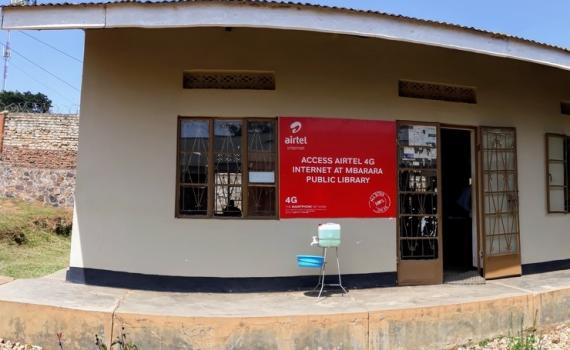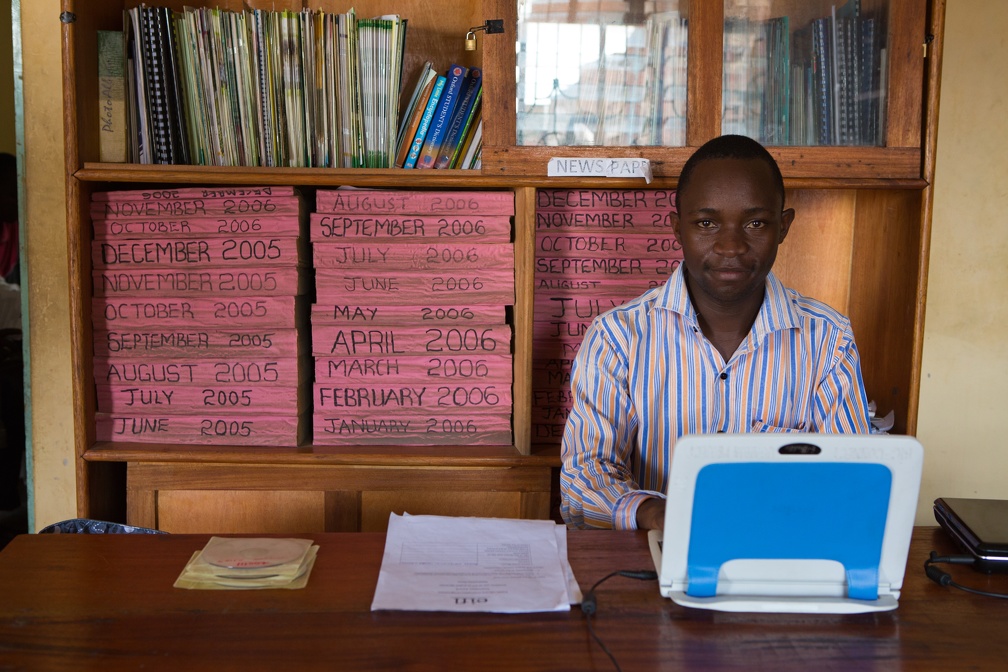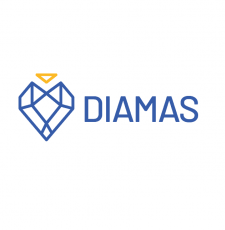
Ugne Lipeikaite and Ramune Petuchovaite of the EIFL Public Library Innovation Programme (EIFL-PLIP) share insights and recommendations for library authorities and governments from two reports on public access to computers and the internet in libraries, and experiences shared by a panel of experts during EIFL’s webinar on ‘Libraries and the Global Digital Compact’.
The recent launch (5 June 2023) of the UN’s Secretary-General’s Policy Brief, A Global Digital Compact - an Open, Free and Secure Digital Future for All has made the subject of public access to digital technology, and libraries’ contribution to narrowing the digital divide and to sustainable development more important than ever before.
In July we organized a webinar, ‘Libraries and the Global Digital Compact’. A panel of guest speakers from Uganda, Kenya, and Ireland shared experiences of setting up, use and impacts of public access computers and the internet in libraries. We presented two research reports on public access to ICT in libraries: Impacts of Public Access to Computers and the Internet in Libraries and The Role of Libraries in National Broadband Plans and Policies compiled by EIFL and IFLA.
Over the past couple of decades libraries across the world have become known and well-established actors in digital inclusion. In the first report, analysis of recent and significant research on the impact of public access to ICT in libraries found that their impact is far greater than simple provision of access: 
- Public libraries serve people from all ages and diverse backgrounds; their services are free or affordable, and they are open to people with all skill levels. This means they reach vulnerable groups - women and unemployed young people, the elderly, migrants, underserved rural communities.
- When equipped with public access ICT, public libraries become versatile online information hubs; library staff are available to assist people in finding and using e-government services, educational resources, news, employment and other relevant information that will help them to make better and more informed decisions about their lives.
- Libraries offer basic and advanced digital skills training programmes that help people to improve their digital competence and positively impact academic performance, job search effectiveness, and community cohesion through social engagement.
In the second report, analysis of national broadband development plans and policies from 38 countries found that governments in different parts of the world onboard public libraries to achieve universal connectivity and digital inclusion goals, in particular to reach those who cannot afford private connections and devices, and those facing marginalization due to lack of digital skills and motivation to get online.
In addition, the national broadband policies trusted different types of libraries (national, research, public, school) with other notable roles, for example -
- Providing access to e-government and other online public services, or to e-commerce services (outlined in Bulgaria, Canada, and Zambia policy documents).
- Equipping citizens with basic digital literacy and/or hosting digital literacy initiatives led by other organizations (mentioned in policies of Botswana, Bulgaria, Canada, Hungary, Turkey, and other countries).
- Fostering access and innovation through digital libraries, e-learning, educational content, and personalized learning (mentioned in Bangladesh, Cambodia, Ethiopia Mauritius policy documents).
- Digitizing and providing access to national heritage materials (Gambia, Slovenia, Switzerland, Qatar, Turkey policies).
- Creation of content in local languages and supporting creativity (Portugal and Turkey policies).
The report also includes case studies of libraries providing public access to computers and the internet, showing that some initiatives were more successful than others and there are some useful learnings for governments wishing to include libraries in national broadband plans and policies.
During the EIFL webinar, the panelist from Uganda Communication Commission gave an update on the annual roll out of ICT infrastructure to public libraries using the Universal Service and Access Fund. In Kenya, the government also used the Universal Service Fund to equip all public libraries with ICT. The webinar panelist from the Kenya National Library Service spoke about new services offered by public libraries using ICT. A serious challenge he mentioned was maintaining the infrastructure. 
We would like to share some recommendations for implementing public access projects in libraries that we draw from the case studies, EIFL-PLIP’s work with libraries in developing and transition economy countries, and discussion from the EIFL webinar:
- Draw on non-traditional public library funding sources to develop and sustain public access infrastructure in libraries, for example, the Universal Service and Access Funds or other government funding programmes for digital public infrastructure, as the library network serves needs across sectors.
- Public access ICT infrastructure is usually funded as a national project, as a one time investment. Public libraries that receive such investment need public funding allocated to their budgets to maintain the ICT infrastructure and continue services.
- Engage library experts among others into ICT infrastructure project planning and management to ensure smooth integration of public access into library services.
- Collect up-to-date data on the library network (such as locations, buildings, electricity, current ICT equipment, connectivity options, and staffing level) to inform sound planning and implementation decisions.
- Assess librarians’ digital skills and make library staff training an integral part of the infrastructure project.
Government agencies such as employment bureaus, and other institutions like banks, schools and colleges, health service providers, should reach out to libraries when planning new e-services and digital skills training. The same applies to libraries, which should develop partnerships with relevant agencies and institutions when planning ICT training and other ICT-based services. Standard library statistics gathering and reporting frameworks should be revised to include data on public access and digital literacy to provide evidence of impact.
Look into impact assessment studies for ideas and tested tools that you can adapt for the evaluation of your public access project in libraries. The EIFL-IFLA report, Impacts of Public Access to Computers and the Internet in Libraries, provides an overview of research methods used to evaluate impact, and is a useful resource.
Resources and further information -
- Libraries and the Global Digital Compact: EIFL webinar (2023).
- Impacts of Public Access to Computers and the Internet in Libraries: a study report by EIFL and IFLA (2022) compiled within the framework of the Internet Government Forum (IGF) Dynamic Coalition of Public Access in Libraries (DC-PAL).
- The Role of Libraries in National Broadband Plans and Policies: a study report by EIFL and IFLA (2021) compiled within the framework of the Internet Government Forum (IGF) Dynamic Coalition of Public Access in Libraries (DC-PAL).
- IFLA’s response (2022) to the UN Global Digital Compact Consultation
- 10 reasons why public access in libraries matters by IFLA (2020)
SHARE / PRINT








